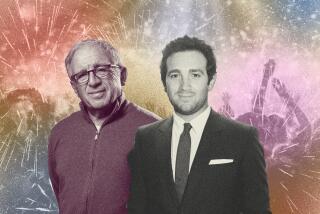Pisello Claims 1st Contact With MCA Was Azoff
- Share via
Reputed mobster Salvatore J. Pisello has told government investigators that his initial contact with MCA Records in 1983 was through MCA Music and Entertainment Group Chairman Irving Azoff, according to papers filed Thursday in U.S. District Court in Los Angeles. It was the first time that Pisello had made any statement to investigators about his dealings with MCA.
Pisello was convicted last month of evading taxes on $382,000 earned through a series of business deals with MCA Records in 1984 and 1985. He did not testify at his trial and has refused all requests from the media to answer questions about his relationship with the record company.
However, according to the government’s pre-sentencing report, Pisello told investigators in an interview last month that he was first introduced to Azoff by the maitre d’ at the Palm restaurant in West Hollywood and that “Azoff referred him to (then MCA Records Executive Vice President) Myron Roth.”
Both Roth and Azoff issued statements declaring that they have no recollection of events as described by Pisello.
Statements made by Pisello to investigators following his conviction are “at odds with the official MCA report,” according to the government memorandum, which was written by prosecutor Marvin L. Rudnick, a special attorney with the Los Angeles office of the Justice Department’s Organized Crime Strike Force.
For example, Pisello told investigators that a $50,000 payment he received from MCA in January, 1985, was a “loan for legal fees in his prior criminal case.” MCA Records executives claimed in a 1985 report to the company’s board of directors that the $50,000 was an advance against commissions that Pisello was to earn from MCA’s distribution agreement with New Jersey-based Sugar Hill Records, which Pisello helped to arrange.
However, Rudnick makes it clear in the memo that he doesn’t believe Pisello’s version of events: “It lacks credulity to believe that MCA would provide financial assistance to Pisello with his legal problems in January, 1985, when company officials have repeatedly denied knowing about his prior indictment until March, 1985.”
‘Self-Described Friend’
Rudnick also says in the memo that “it strains common sense that Pisello could be so successful in his dealings with MCA through the introduction of an unidentified maitre d’.
In a statement issued by MCA’s outside counsel, Azoff said Friday that he had “no recollection” of being introduced to Pisello at the restaurant, although he “has eaten there many times.”
The memo also states that another reputed mobster, Rocco Musacchia, attended a meeting with Myron Roth and Pisello in 1983. Musacchia has been identified by the FBI in court documents as being connected to the “highest level” of New York’s Genovese crime family. Musacchia is described in the memo as Pisello’s “50% partner and self-described friend.”
Through MCA’s outside counsel, Myron Roth said Friday that he had “no recollection” of Musacchia attending a meeting with Pisello at MCA.
The government’s pre-sentencing report states that Pisello’s explanation of his role in the 1984 sale of nearly 5 million MCA “cutout,” or discontinued, records was “inexplicable.” Pisello told investigators that Roth had asked him if he could sell cutouts “even though (Pisello) never heard of a cutout record at the time of the request.”
According to the report, “Pisello then sought the help of long-term personal friend Morris Levy,” the owner of Roulette Records in New York, to sell the records.
Levy is set to stand trial Monday in U.S. District Court in Camden, N.J., on charges of extorting a customer in that cutout sale. Pisello’s sentencing on the tax evasion conviction is also set for Monday in U.S. District Court in Los Angeles. He faces a maximum of 10 years in prison and a $200,000 fine.
More to Read
The biggest entertainment stories
Get our big stories about Hollywood, film, television, music, arts, culture and more right in your inbox as soon as they publish.
You may occasionally receive promotional content from the Los Angeles Times.










